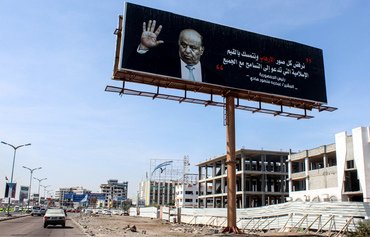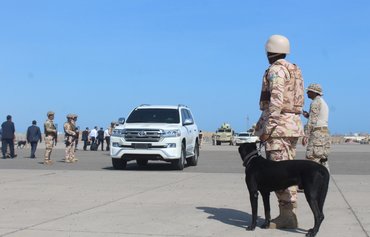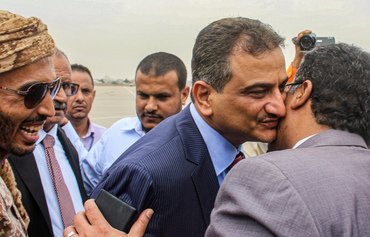Yemen’s Foreign Ministry and other government ministries on Sunday (November 10th) announced they had resumed work after completing the necessary arrangements for resuming their full roster of duties.
The move followed the November 5th signing of the Riyadh agreement between the Yemeni government and the Southern Transitional Council (STC).
Yemeni President Abd Rabbu Mansour Hadi on Saturday instructed all state agencies and institutions to immediately start implementing the Riyadh agreement and its provisions on the ground, local news agencies reported.
Prime Minister Moeen Abdul Malak is scheduled to return to Aden on Tuesday with a small cabinet team pursuant to the agreement, which called for the government to return to Aden within seven days of its signing.
![A billboard bearing a portrait of Yemeni President Abd Rabbu Mansour Hadi is displayed on a main road in the port city of Aden on November 6th. [Saleh al-Obeidi/AFP]](/cnmi_am/images/2019/11/12/20857-Yemen-Aden-billboard-600_384.jpg)
A billboard bearing a portrait of Yemeni President Abd Rabbu Mansour Hadi is displayed on a main road in the port city of Aden on November 6th. [Saleh al-Obeidi/AFP]
This is to enable the government to oversee the payment of public sector salaries and the provision of essential services, local media said.
Resumption of services
As of Sunday, the Foreign Ministry announced it had resumed all of its activities from the provisional capital of Aden.
Other ministries and institutions, including the Department of Immigration, Nationality and Passports, said they had completed the necessary arrangements and preparations for resuming their services to the public.
“Arrangements are under way for resuming work at the finance and civil service ministries in preparation for the return of ministers," Aden-based journalist Radhawan Farie told Al-Mashareq.
“Some ministries, including the finance and water resources ministries, have already resumed work through deputy ministers,” he said.
“The Health Ministry has been working under some deputy ministers, and the general managers are attending to their work," he added.
Hospitals, health centres, schools and universities remained open throughout recent circumstances, he noted, and are continuing to provide services.
After the signing of the Riyadh deal, the pace has picked up in Aden, Farie said.
“Some agencies stopped working because of security concerns following the armed confrontations in August between the STC and national army,” he said.
Managers have promised that the Department of Immigration, Nationality and Passports will resume the issuance of passports as of next week, he said.
This will be a welcome development for patients who need to travel overseas to receive treatment, Farie said.
The agency's closure "has forced those who have financial resources to travel to neighbouring provinces, including Hadramaut and Shabwa, to have passports issued”, Aden resident Hussein Salem told Al-Mashareq.
In addition to the inconvenience, many families cannot afford the additional cost, he said, "and the stoppage of passport issuance and airport closure has aggravated the suffering of patients and their families".
Implementation will take time
The Yemeni government closed the airport and other government institutions after separatist forces seized control of Aden in August, forcing the government to leave Aden for the Saudi capital of Riyadh.
It is not likely to be easy to implement the agreement on the ground, political analyst Faisal Ahmed told Al-Mashareq, so all parties need to be flexible.
“Some provisions of the deal may need a longer time to implement, including the return of government,” he said, pointing out that a full return to service is likely to take longer than the allotted seven days.
“Security arrangements and preparations for the resumption of work at some ministries and institutions will need a longer time because some were looted” during the recent fighting, he said.
“Difficulties on the ground will need full understanding by the two sides and direct intervention by Saudi Arabia, which sponsored the agreement,” he said.
“Saudi forces also will need to deploy to the city to resolve the obstacles that may impede the implementation of the deal on the ground,” Ahmed added.

![This picture taken November 6th shows a busy street in the centre of the port city of Aden. [Saleh al-Obeidi/AFP]](/cnmi_am/images/2019/11/12/20856-Yemen-Aden-street-600_384.jpg)






